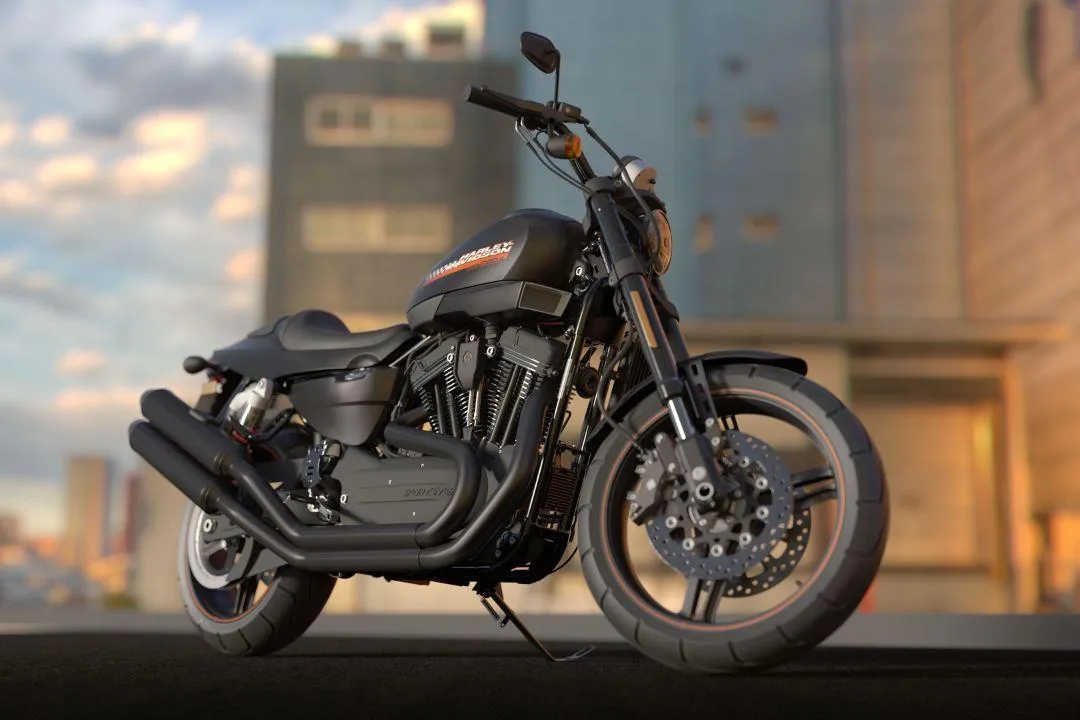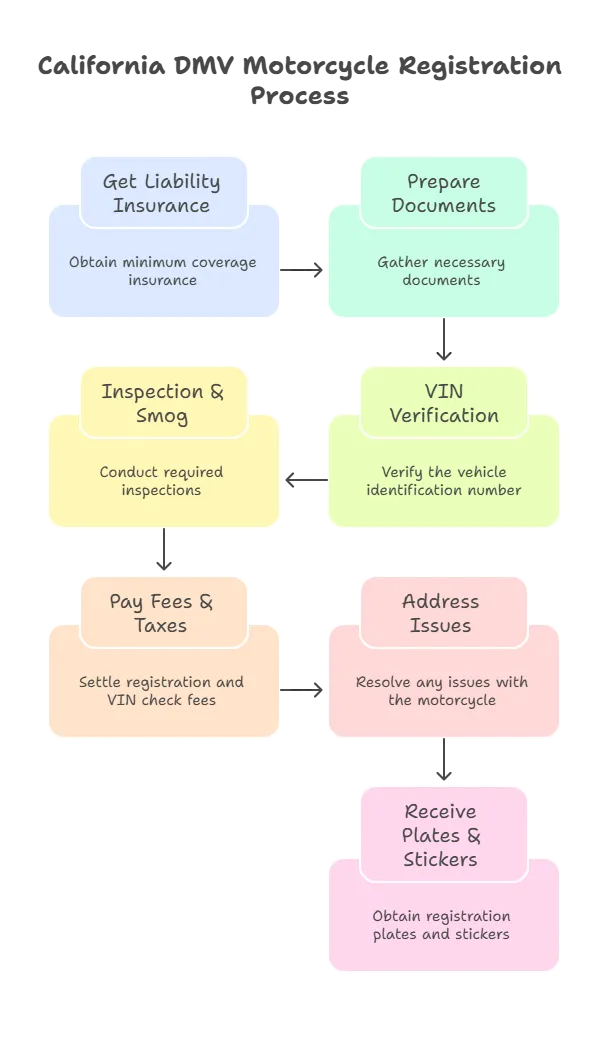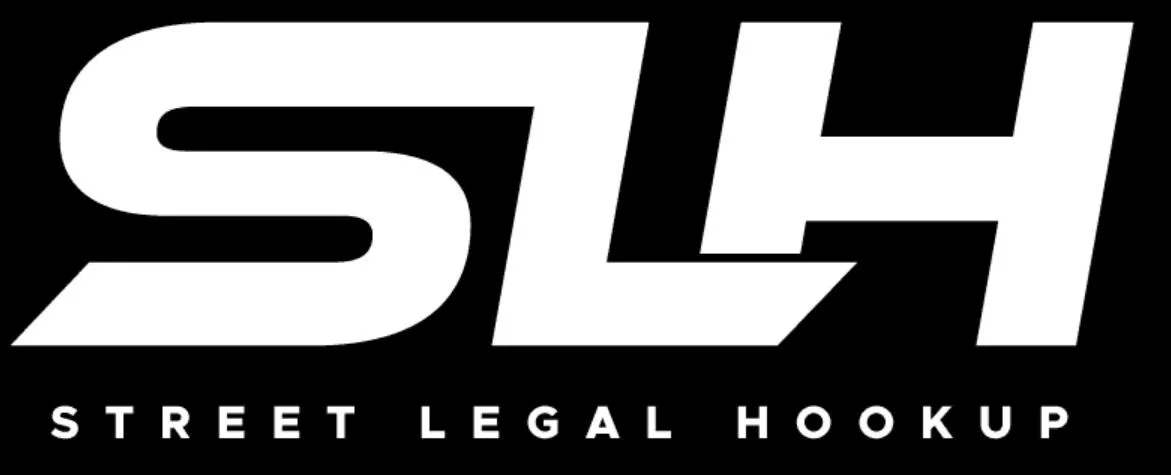Get your vehicle registered, fast.
How to Make a Motorcycle Street Legal in California

Over 800,000 motorcycles are registered in California, but getting yours street legal can feel like a maze. The California DMV enforces strict rules on registration, safety equipment, and licensing. New riders in Los Angeles, custom bike builders in San Diego, or off-road enthusiasts in Sacramento often face complex paperwork, high taxes, and inspections.
This guide explains the steps to make your bike road-ready. You’ll learn about California’s laws, DMV processes, and ways to simplify registration. Whether you ride a used cruiser or a custom chopper, this article offers clear guidance.
Key Takeaways
Navigate California motorcycle laws and safety standards.
Complete the motorcycle registration process with the DMV.
Explore alternative registration methods to save time and money.
Address challenges for custom and off-road motorcycles.
Meet licensing and equipment requirements confidently.
Understanding California Motorcycle Laws
California’s California vehicle code motorcycle rules ensure motorcycles are safe for public roads. A motorcycle is a two-wheeled vehicle with an engine of 150cc or larger. Scooters at 150cc follow the same rules. For highway use, your bike needs at least 150cc to maintain safe speeds of 55 to 70 mph. Smaller vehicles, like 50cc mopeds, have separate rules and may not be freeway-legal.
To ride legally, you need an M1 endorsement on your California driver’s license. A car license (Class C) does not allow riding any motorcycle, including a 150cc scooter. The M1 process includes:
- Passing a written test on traffic laws and motorcycle safety.
- Completing a skills test at the DMV or an approved site.
- Taking a California Motorcyclist Safety Program (CMSP) course, which waives the skills test.
The CMSP, offered in cities like San Francisco or Orange County, teaches safe riding techniques. It’s ideal for new riders. A motorcycle learner’s permit allows practice on most roads but bans freeway riding and passengers. This helps you build skills safely.
Motorcycle equipment requirements are strict. Your bike must have:
- A DOT-compliant helmet (half helmets are legal if DOT-approved).
- Front and rear turn signals for visibility.
- Headlights, taillights, and brake lights for day and night riding.
- Side mirrors, brakes, and a horn for safety and communication.
Full-face helmets add extra protection but aren’t required. Earbuds are illegal while riding, as they block traffic or emergency sounds. Ape hanger handlebars, common on custom cruisers, are legal if they stay within 6 inches above your shoulders when seated, per Vehicle Code Section 27801.
California allows lane splitting, letting riders move between slow or stopped traffic, such as on I-405 in Los Angeles. The California Highway Patrol (CHP) advises:
- Keep speeds within 10 mph of surrounding traffic.
- Avoid reckless maneuvers to stay safe.
Motorcycle speed limits match cars, typically 65 to 70 mph on freeways. Check local signs, as cities like San Francisco may have lower limits. High-cc bikes, like 1000cc sport bikes (e.g., Yamaha R6), follow the same rules but require careful handling due to their power.
The California Air Resources Board (CARB) sets emissions rules. In counties like Los Angeles, Orange, or Riverside, bikes made after 2000 may need a smog check for California motorcycle compliance. Older bikes, 11 years or older, are often exempt. Rural counties like Shasta may skip smog checks. Bikes without CARB-approved exhausts are street-illegal and can’t be registered without upgrades. Check the Vehicle Code for updates to stay legal.
Step-by-Step Guide to California DMV Motorcycle Registration
The California DMV motorcycle registration process requires careful steps. You don’t need an M1 license to register, as ownership and riding are separate. You must have liability insurance with:
- $15,000 for injury or death to one person.
- $30,000 for injury or death to multiple people.
- $5,000 for property damage.
Motorcycle insurance costs $200 to $800 per year in California. A 1000cc sport bike in San Diego may cost more than a 250cc bike in a rural area. You can buy a motorcycle without an M1 license or insurance, but insurance is needed before registration.
For a new motorcycle, submit:
- Manufacturer’s Certificate of Origin (MCO).
- Proof of insurance.
- Completed Form REG 343 (application).
For a used bike, provide:
- California motorcycle title or bill of sale to prove ownership.
- Proof of insurance.
- VIN verification form, if needed.
If registering a used off-road bike, a bill of sale helps but isn’t required if you have a signed title or dealer invoice. After buying a used bike, check for:
- Frame damage or missing VIN plates.
- Mileage over 50,000, which may raise DMV concerns.
- Salvage titles or crash damage, which can cause rejections.
The DMV requires a Vehicle Identification Number (VIN) verification by a DMV employee, CHP officer, or licensed verifier. This confirms the VIN matches the title. A custom chopper in Sacramento, for example, may need a CHP inspection. Fees include:
- $23 to $60 for registration.
- $27 for CHP VIN verification, if needed.
- Sales tax based on the bike’s value, often hundreds or thousands.
A Harley-Davidson touring bike could face a tax bill of $2,000 or more. In counties like Los Angeles or Orange, newer bikes need a smog check. If your bike fails, apply for a smog waiver after spending $650 on emissions repairs. Approval varies, so contact your local DMV. The DMV’s buy-back program, or Lemon Law, covers defective motorcycles under warranty. If your bike has ongoing issues, the manufacturer may repurchase it. Check the DMV’s Consumer Assistance Program for eligibility.
Once approved, you’ll get a motorcycle license plate California and registration stickers. The California motorcycle inspection process can take 2 to 6 weeks, especially in busy DMV offices like Los Angeles. To avoid delays:
- Double-check all documents before submission.
- Schedule VIN verification early.
- Confirm insurance coverage meets requirements.
Plan ahead to avoid riding illegally while awaiting approval.

Streamlined Registration Options with Street Legal Hookup
The DMV’s process can be slow and costly. Street Legal Hookup offers a Montana LLC registration as a legal alternative. This simplifies motorcycle registration California for riders wanting to save money. You can register without an M1 license. Your bike needs liability insurance, with the Montana LLC listed as an additional interest. Insurance costs $200 to $800 per year, based on your bike’s size and coverage.
The Montana LLC process offers:
- No California sales tax, saving $5,000 to $15,000 on bikes like a 1200cc cruiser or 1000cc sport bike.
- No smog checks or motorcycle safety regulations inspections.
- Permanent plates for bikes 11 years or older, skipping yearly renewals.
You submit documents like the title or bill of sale online via a secure dashboard. Street Legal Hookup manages LLC setup and paperwork. Plates ship in 3 business days, with 40-day temporary tags available. No Montana residency is needed, so California riders qualify. California may charge use taxes if your bike stays in-state, like in Los Angeles.
Consult a tax professional to stay compliant. This option suits street-legal bikes meeting federal safety standards. Learn more about alternative registration methods on Street Legal Hookup’s website.
Special Considerations for Custom and Off-Road Motorcycles
Custom and off-road motorcycles face unique hurdles. Street Legal Hookup helps with these challenges. A street-legal bike meets all street legal motorcycle requirements, like DOT-compliant equipment and DMV registration. Examples include:
- Cruisers (e.g., Harley-Davidson Softail).
- Sport bikes (e.g., Yamaha R6).
- Touring bikes (e.g., Honda Gold Wing).
Off-road bikes, like a Yamaha YZ250F, are street-illegal without upgrades due to missing lights or emissions controls. To make an off-road bike street-legal, install:
- DOT-compliant rear turn signals and front lights.
- Brake lights, mirrors, a horn, and a speedometer.
- CARB-approved exhaust for emissions.
A KTM 450 EXC-F, for example, needs these to pass a CHP inspection. Ape hanger handlebars must stay within 6 inches of your shoulders. When buying a used custom or off-road bike, check:
- Clean title and intact VIN.
- Mileage under 50,000 to avoid issues.
- No salvage titles or non-CARB exhausts.
High-cc bikes (1000cc or more) need extra emissions checks. Street Legal Hookup aids with street legal motorcycle modifications and title recovery. Their Montana LLC option often skips CHP inspections. Download our checklist for California motorcycle inspection standards.
Why Choose Street Legal Hookup for Motorcycle Registration? Your Trusted Partner
When it comes to registering your motorcycle or making it street legal, you need a service you can trust. Street Legal Hookup has helped thousands of owners across all 50 states complete the process quickly, legally, and without the usual DMV frustrations.
- Nationwide expertise: We register everything from rare classic cars and luxury RVs to imported motorcycles and military vehicles.
- Significant cost savings: Our Montana LLC process helps clients legally avoid sales tax and inspections, saving $5,000 to $15,000 on average.
- Simple online process: Skip DMV visits and paperwork stress. Submit documents securely through our online platform and track your progress in real time.
- Fast turnaround: Permanent plates shipped in as little as three business days, with temporary tags available within one day.
- Proven track record: Thousands of successful registrations each year backed by a money-back guarantee.
- No Sales Tax: Save thousands instantly with zero vehicle sales tax.
- No Emissions or Inspections: Skip smog checks and safety inspections for a streamlined process.
- Permanent Plates: Get one-time permanent plates for eligible vehicles, no annual renewals.
- No Residency Required: Register legally through an LLC, no matter where you live.
FAQs on Motorcycle Registration in California
Got questions about making your motorcycle street legal? Here are answers to common concerns:
What makes a motorcycle street-legal in California?
A street-legal motorcycle in California needs a DOT-compliant helmet, working lights, mirrors, turn signals, brakes, and a horn. It must meet CARB emissions standards, have a valid title, and be registered with the DMV, including license plates and stickers.
How to make an off-road motorcycle street-legal?
To make an off-road motorcycle street-legal, add DOT-compliant lights, mirrors, turn signals, brakes, a horn, and a speedometer. Complete VIN verification and a CHP inspection, if required. Street Legal Hookup can simplify this with our Montana LLC process, avoiding inspections.
Can you register an out-of-state motorcycle in California?
Yes, you can register an out-of-state motorcycle in California. Provide the out-of-state title, VIN verification, proof of insurance, and pay registration fees ($23 to $60) plus taxes. We streamline this process, saving you time and money.
How much does it cost to register a motorcycle in California?
California motorcycle registration costs $23 to $60, plus a $27 CHP fee for VIN verification, if needed. Taxes based on the bike’s value add hundreds. Our Montana LLC option eliminates sales tax, saving $5,000 to $15,000.
Do motorcycles need smog in California?
In select counties (e.g., Los Angeles, Orange), newer motorcycles may require a smog check to meet CARB standards. Older bikes (11+ years) are exempt. Our Montana LLC registration skips smog checks entirely.
Can you register a motorcycle without a license in California?
Yes, you can register a motorcycle without a California driver’s license or M1 endorsement, as registration is separate from riding privileges. However, you need proof of ownership, VIN verification, and insurance. We handle this seamlessly online.
Conclusion
Making your motorcycle street legal in California involves navigating DMV paperwork, safety standards, and emissions rules. You need an M1 endorsement, DOT-compliant equipment, and proper registration. Custom and off-road bikes require extra steps, like CHP inspections. The DMV process can cost hundreds in fees and taxes, with delays up to 6 weeks.
Street Legal Hookup’s Montana LLC option saves $5,000 to $15,000 and skips inspections. With the right preparation, you can ride confidently. Visit Street Legal Hookup today to start your hassle-free registration!
For step-by-step instructions on equipment, documents, inspections, and state-by-state rules, see our State-by-State Motorcycle Street Legal Registration Guide to ensure your bike is road-ready without delays or penalties.

Register or Title Your Vehicle From Any State, Stress-Free
Click below, answer a few quick questions, and start your registration in minutes.
Get Road-Ready EasilyREADY TO get street legal?
Register or Title Your Vehicle From Any State, Stress-Free.
Click below, answer a few quick questions, and start your registration in minutes.

Register or Title Your Vehicle From Any State, Stress-Free. Guaranteed
Street Legal Hookup
Register Your Vehicle
LEGAL
STREETLEGALHOOKUP.COM IS A MONTANA VEHICLE REGISTRATION COMPANY, UNAFFILIATED WITH ANY GOVERNMENT AGENCY © 2025 Street Legal Hookup Inc. All rights reserved. Privacy Policy | Terms Of Service
